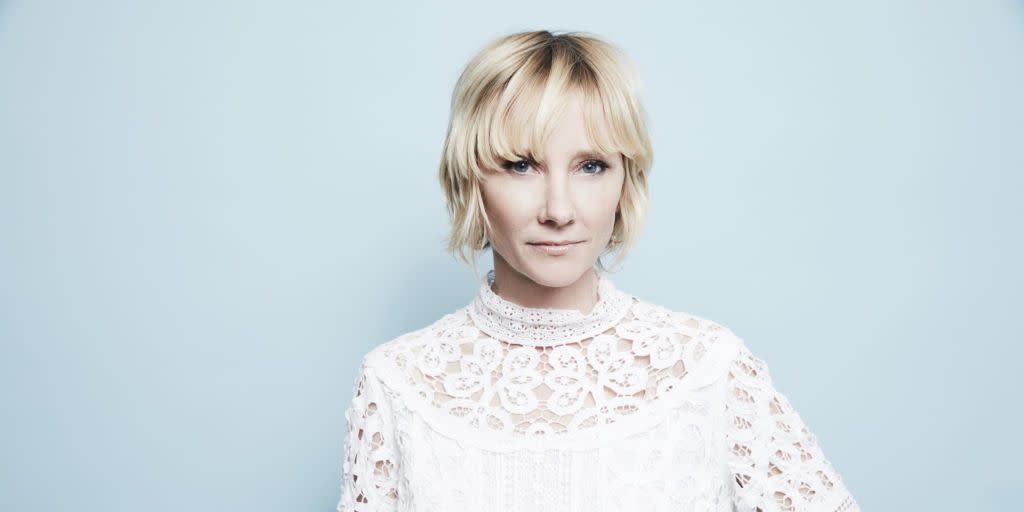Anne Heche Was a Queer Original

- Oops!Something went wrong.Please try again later.
I vividly remember the day when, as a production assistant in the writers room of the ABC show Men in Trees in 2007, I was finally tasked with the job I had been coveting: delivering a script to the home of the show’s star, Anne Heche. The house where she lived with her first husband was on a shady, serene Hancock Park block. When I got there, no one answered the door and I left the script on the doorstep as I had been told to do.
I did not get to speak with her and I never met her. What remains in perfect focus to me all these years later is the feeling of anticipation I felt driving up to her house, not because she was a star—though the one thing everyone always said about her was that she was incredibly talented—but because, as far as I knew then, she was the only adult woman on the planet who had had anything like the kind of bisexual rollercoaster I was on in my own personal life at the time. She was the only person who had ever been honest about it in public, anyway. She was the only woman I’d ever seen stand up and say, I’m beautiful, men want me, I’m at the top of my game, I think it’s time for me to go date a total dyke. And no, I won’t be apologizing.
That this wound up going badly for her is no surprise. That people still don’t talk about Heche, who died last week after she was critically injured in a car accident, as a queer icon, but rather as someone insane, is also no surprise. She broke the rules too wildly, too impulsively, and too completely. It wasn’t the way you’re supposed to break the rules.
Even at the time, when I was twenty-two and secretly her biggest fan, longing to simply catch a glimpse of her in the doorway on that sun-dappled afternoon, I also rolled my eyes to my friends about the fact that I was working on her show. She was a bisexual icon, and what that meant, at the time, was that she was both too gay (‘obsessed with Ellen’) and too straight (‘now she’s married to some guy!’). She provoked everyone somehow, and satisfied no one completely. People suspected that she was calculating but preferred to think that she was batshit. Who can forget the tabloids when, after her relationship with Ellen Degeneres ended in 2000, she showed up on a stranger’s doorstep in her bra and ended up going inside and taking a shower at that stranger’s house, and watching a movie with that stranger, before the police finally arrived and she told everyone that it was time for them all to board a spaceship? There is actually a world in which that’s a reasonable reaction to a devastating, public break up, but that wasn’t the point. Her open bisexuality had destabilized the way in which the world looked at her. I saw that, and it frightened me. She was a cautionary tale. And yet, she was fabulous. Which itself is about as queer as you can get.
In a spirit of both irony and devotion, my co-PA and I decided that we would listen to Anne Heche’s memoir, Call Me Crazy, on audiobook during the long hours when we were putting scripts together. I think we expected camp, but what we found was a real writer. Her story of years of rape at the hands of her abusive, closeted, religious father was bizarre, baroque, and heartbreaking—and her clear-eyed, honest look at him and her own childhood was revelatory. I was amazed and impressed that this woman had survived so much, and achieved so much, with so little support, and still had the guts to take the kinds of risks she had taken in her work and her very public private life. There was also something deeply American about her story. She was a hero. I had a strange, disturbing feeling then in our offices, as I listened to her audiobook: maybe people discredit her because she’s telling the real truth and not the truth they want to hear.
The events of Anne Heche’s car crash sound as bizarre and baroque as many of the other events of her life. The red wig. The salon owner, who was one of the last people to interact with Heche the afternoon of her accident, and his weird quote that Heche “wasn’t speaking in cursive,”which was apparently his way of saying she didn’t sound intoxicated. The woman renting the Mar Vista house Heche crashed into, who got her turtle and two dogs out of the burning building alive. The fact that no one but Anne herself was harmed.
And also, it sounds just as heartbreaking. I am sad for her, that she was so unhappy at the end, and still so misunderstood. And I am sad for me, as I would have loved to someday have the opportunity cast her in a role as the queer original that she was, and show her to the world as I see her now. RIP to a real one.
You Might Also Like

